
Interview with a Bookstore: Raven Book Store
Cats, Nonexistent Books, and Community-Building in Kansas
Raven Book Store is an independent bookstore in Lawrence, Kansas. The bookstore’s Twitter recently went viral when it tweeted an explanation of wholesale costs for independent bookstores vs. ecommerce giants like Amazon and the high cost of a getting a “cheap book.”
*
Do you have bookstore pets or animal regulars?
Danny Caine, owner: For many years we’ve had two store cats, Dashiell and Ngaio. Dashiell is the gregarious one, a large boy who loves food and attention (most of the time). His main perch is a tall chair right next to the register; he tends to show off most for women, but he hates children. He also keeps very careful track of which employees have given him human food in the past, and distributes his begging accordingly. Meghara, who’s been known to give him parts of a Jimmy John’s tuna sub, bears the brunt of it. Ngaio is our reclusive old lady. She loves sleeping in the sunny front window, but when she wants cuddles she wants them hard. She’ll sit by the front door and meow at anyone who comes in, turning around to lead them towards the couch where she’ll colonize their lap as long as they’ll let her.
*
What’s been the biggest surprise about running a bookstore?
Lily Bay, bookseller: The biggest surprise for me has been how much I combine the mannerisms of my coworkers. I call people to tell them the book they ordered came in the same way Chris does, I answer the phone the same way Morgan does, and I’ve picked up Kelly’s way of addressing the cats. Some part of it is that I copied the person who taught me how to do things, but I think the bigger part is that we’re such a close community, and I feel really comfortable being around everyone who works there. I’m also constantly amazed at how much behind-the-scenes work goes into making the store run smoothly. It makes such a difference actually working in the store rather than just volunteering.
*
Most-requested out-of-print book:
Katie Foster, bookseller: I’ve had two instances of customers requesting Sue Henry’s nonexistent Cold as Ice—the book was scheduled to come out in 2014 but it has mysteriously failed to materialize. I think this speaks to how dedicated our customers are—they’re thorough readers who want to read everything by their favorite writers, even when the book doesn’t exist!
*
What’s a children’s book that you think all adults should read?
Mary Wahlmeier, bookseller: It may be a cliché, but Shel Silverstein’s The Giving Tree is a must-read for adults. It’s on display right now in the store. It was staring at me, judging me as I browsed the children’s section. I picked it up and re-read it, and I was overcome with the impulse to spread kindness like butter. Ultimately, the message calls readers to examine their own relationships, the give and take, in the hopes of preventing the selfless but tragic give, give, give.
*
How do you use the bookstore to build community?
Morgan McComb, assistant manager: Community is central for us. On a basic level, our store is a space for our community members to meet and listen to authors and discuss books as well as other community events. One of our most successful community events has been the Mic Supremacy series, an open mic night for people of color that’s run by poet and activist Jameelah Jones. When you go to Mic Supremacy, you can feel the Raven being transformed into a completely different space, buzzing with energy and feeling. Our community partnerships are also essential—we work hand in hand with partners like the Lawrence Public Library who are just as devoted as us to bringing great authors and events to the Lawrence area.
As individual booksellers, I think we also create small communities every day with our customers when they come to us to ask them to find a perfect book. I like the thought of members of our community thinking, “I need a new book, let me go talk to Chris, or Kelly, or Sarah.” They know us and we get to know them—both as readers and as people. That’s a truly unique thing about independent bookstores: everything is personal and personalized for the unique communities we serve.
*
Tell us about your most memorable author event.
Kelly Barth, bookseller: Once a local clairvoyant (and former city commissioner) wanted to have an author talk/panel discussion. It turned out that she has long channeled someone named “George,” who gives her and others advice. While we watched, she submitted herself to George; her assistant, another local author and retired professor, asked the spirit questions. She delivered his answers in a different voice.
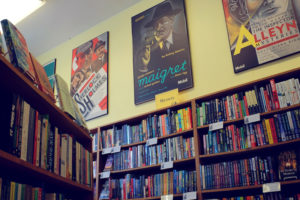
*
If you had infinite space what would you add?
DC: I would love a well-designed event space. We’re really trying to increase our event programming, and while our space limitations force us (in a really good way) to partner with great community spaces like the Lawrence Public Library, I’d still love to have a more comfortable and specifically designed space for in-store events. Moon Palace Books in Minneapolis has an amazing event space and I’m totally jealous.
*
What’s your message to Amazon (and Amazon customers)?
DC: We recently had a Twitter thread about Amazon go viral, which essentially answered this question. To Amazon, I’d ask: do you know what you’re destroying? And you’re cool with this? To Amazon customers, I’d reiterate that convenience and low prices come at a high cost. I’d ask Amazon customers: do you value the idea of a vibrant community-driven downtown? Do you value privacy? Do you value the idea that someone can open a small business and make a living in America? Do you value having control over your personal information? Do you value a landscape that’s not riddled with vacant storefronts? Do you value a publishing industry that champions many voices and perspectives, where even a small press can earn money off their books?
Spoiler alert: Amazon.com does not value those things. I don’t know about anybody else, but I like to try to spend my money at businesses that value the same things I do. If you value convenience and low prices above all else, that’s fine. Just remember what happens to everything else when price and speed get top priority. Your dollar is a vote for what you think is important.
*
Have you felt any shift in what it means to be a bookseller under the Trump administration?
DC: On our Twitter profile, there’s a pinned tweet that’s essentially my bookselling philosophy. It says, “We do not believe reading a book is enough to combat the spread of hatred and fascism. However, we believe it’s a good start.” Once, someone retweeted this, adding something like “If you foreground your politics you’ll lose half your customers.” What an abuse of both-sides thinking. If speaking against hatred and fascism will cost me half my customers (it won’t), then I say good riddance, especially to people who think hatred and fascism are good things! As an independent bookstore in Kansas, we may not have the biggest platform, but we do have a platform.
Bookselling during the Trump era has taught me one thing: the act of tiptoeing around current issues for fear of getting “too political” feels a bit cowardly. It’s a waste both of time and of the platform we’re privileged enough to have. There’s no such thing as “not political.” Every decision we make as booksellers (not to mention as humans) is political, so it’s foolish to try to avoid “being political.” And to the person who warned me about losing “half my customers”: since we’ve gotten “more political” in our messaging, our sales have gone up.
*
What’s a bestseller that could only be big in your town?
DC: Our number one bestseller of all time, by a long mile, is Missy McCoy’s Paradise Café & Bakery Cookbook. It’s a self-published spiral-bound collection of recipes from a beloved and departed downtown restaurant. Our other bestselling author ever is Louise Penny, but Missy McCoy has sold more copies of her cookbook than we’ve sold all copies of Louise Penny’s books combined. I love this. I love running out of copies over and over and calling Missy on the phone and telling her we need more. I love being the only store in the world that carries this book. I love that our bestselling title ever is a local book. And I love that although I was never lucky enough to eat at the Paradise Café, I can still feel the adoration for it in our town.
_____________________________________________________
SHELF TALKERS
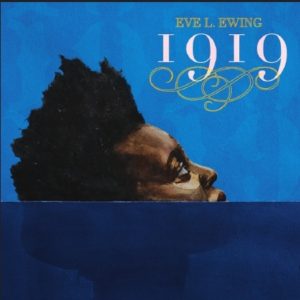
Eve Ewing, 1919
1919, Eve L. Ewing’s striking second book of poems, is a deep dive into the little-discussed race riots that tore through Chicago in the summer of 1919. Carefully interweaving source material from a 1923 report called “The Negro in Chicago,” Ewing employs her vivid poems to present a human, empathetic vision of that summer. Poems reaching into the present day, like the stunning closer “I saw Emmett Till this week at the grocery store,” make a strong case that these century-old events still reverberate today. Equal parts poetry collection and sweeping historical narrative, 1919 has the feel of an instant classic.
–Danny Caine
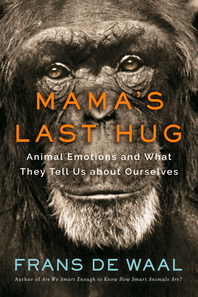
Frans de Waal, Mama’s Last Hug
Mama’s Last Hug, by renowned primatologist and animal behaviorist Frans de Waal, offers a breakthrough look at the emotional complexity of animals. Based largely on his research with a troupe of captive chimpanzees and their matriarch, Mama, this work shatters the outdated and wrongheaded science that maintains humans alone experience a range of emotions from joy to sadness. I found his compilation of laughter research especially interesting—it turns out that even rats laugh when tickled. This is soft science at its best.
–Kelly Barth
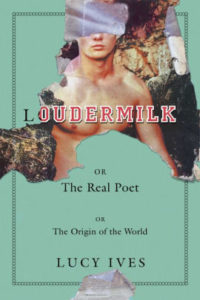
Lucy Ives, Loudermilk
Loudermilk—whose name says it all—and his friend and gifted poet, Harry, come up with a plan: to get into a funded MFA program for poetry, together, as one entity. Harry, crippled by his social anxiety, writes the poetry, while Loudermilk acts as the face of their operation after their application is accepted by a prestigious MFA program in Flyover Country, Iowa. Meanwhile, another writer, Clare, suffering from a crippling case of writer’s block, heads to Iowa in the hopes that something there will shake her creative brain into action. Hysterically funny and scarily realistic, Lucy Ives’ Loudermilk is a literary novel, but its tongue-in-cheek prose and healthy dose of self-criticism keeps her novel from taking itself too seriously. As Loudermilk and Harry’s plan comes closer and closer to unraveling, Ives’s self-deprecating and devastatingly honest portrayal of higher education and the search for artistic identity will have you laughing out loud and racing towards the final chapter.
–Morgan McComb
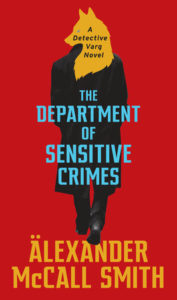
Alexander McCall Smith, The Department of Sensitive Crimes
My goodness! Alexander McCall Smith seems to have an infinite capacity to create charming, quirky, thoughtful characters, who inevitably leave us smiling. Here is his new creation: Detective Ulf Varg of the Department of Sensitive Crimes in Malmo, Sweden. A bit fusty, but completely lovable, Ulf lives alone with his lip-reading deaf dog, pines after a married member of his squad, and solves the “little” crimes—that is, the unusual and sometimes overlooked crimes. This is Smith’s self-proclaimed “Scandi-blanc,” a mystery of the Northern climes that is short on darkness and violence but long on humanity and heart.
–Sarah Young
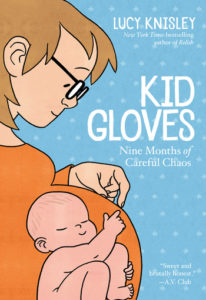
Lucy Knisley, Kid Gloves
Lucy Knisley’s latest, Kid Gloves, is a beautiful graphic memoir about her personal experiences with pregnancy. She recounts several heartbreaking miscarriages, bringing light to the stigma surrounding such tragedies, and provides historical information about pregnancy and birth-related care. Finally, she surpasses the 12-week mark of pregnancy, after which the risk of miscarriage is lessened, and officially announces her pregnancy to her loved ones. Endearingly referring to her growing child as “Pal,” Knisley’s narration of her pregnancy is delicate, nuanced, and often funny. Catering to those across the spectrum of parenthood, Kid Gloves is a moving, fearless triumph—I loved every page.
–Mary Wahlmeier



















